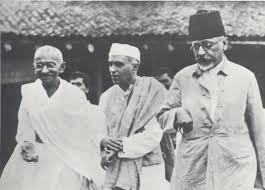Firoz Bakht, popularly known Muhiyuddin Ahmad born in 1888 was 2 years old the time his parents decided to settle in Calcutta. Maulana Khairuddin, his father gained fame as a religious guide in the same city.
While he was a teenager, Muhiyuddin Ahmad acquired the pen name Abul Kalam Azad and earned great prestige for his religious and literature writings in journals published in Urdu during his time.
Maulana Azad acquired traditional education which his father gave him ; did not attend a Madrasa or any western education institution. He completed the course of higher Islamic education at just 16 instead of the normal age group of 20 or 25 while learning at home. During that time he got fascinated by the work of Sir Syed Ahmad Khan. Maulana started learning English while keeping it hidden from his father. Within no time his effort granted him thorough learning of the English language which helped him to study various advanced philosophy and history books.
This guided him not to be noticed by others, to the stage of 'atheism' and 'sinfulness’ in his words. Maulana Azad stayed put in a kind of religious dilemma until he became twenty - two. During the same period of time his political views were also heating up. Deep inside him, the want of freeing his country from the rule of the British was reaching new highs. But he was not in sync with the Congress movement because of it being slow. He even had a disinterest to be associated with the Muslim League as its political goal according to Maulana Azad was unpredictable.
This led to his association with the Hindu rebels of Bengal despite their indifferent behaviour towards the Muslims. It was Maulana who convinced them that by excluding Muslims from the group might result in an increasingly difficult political struggle.
With an aim to make his community more political, Maulana Azad introduced a weekly in Urdu; the Al - Hilal from 13 July 1912 in Calcutta. The influence of the weekly huge ; it stunned the conservative people and generated a severe uproar; but he already had built up a huge Muslim following. Through the writings of his weekly, Al-Hilal, Azad started to criticise the faithful behaviour of the Muslims towards the British, and the antagonistic behaviour of the British towards the Muslims. This made the Bengal Government less pleased and they pressurised the paper. When this publication got banned during the World War 1 he started another weekly the Al-Balagh from Calcutta, that continued printing till the date 31 March 1916.
He became the President of the Indian National Congress twice. For the 1st time in the year 1923 when he was only 35 years old, and the 2nd time in the year 1940. Azad continued to serve as the President of the Congress till 1946, in the absence of election during this period because every Congress leader was behind bars as the Quit India Movement was in full swing in the year 1942.
When the leaders were released Azad, being the President of the Congress, started negotiations with the British Cabinet Mission in 1946. When India became independent from British rule Maulana Azad got appointed the Education Minister and continued to serve until February 22, 1958 which was when this great leader died. On the same date Pt Nehru announced : Aaj humara Mir e Karawan chala gaya or today we lost the guiding force of our caravan !!
Azad’s educational ideas can be found scattered in his speeches, writings and letters that run in to many pages. He was truly a man of many parts who led our nation towards the ever burning flame of education and hope, he should be credited for the beautiful learnings he gave us through his writings.
Pt. Nehru described him as : ‘a great man’ a man of luminaries, intelligence and intellect with an amazing capacity to pierce through a problem to its cause. The word "luminous" is perhaps the best word I can use about his mind. When we miss and when we part with such a companion, friend, colleague, comrade, leader and teacher, there is inevitably a tremendous void created in our life and activity."
While serving the nation as the education minister, Maulana Azad made a national education system, no fee primary education remained his utmost focus. In 1922, he was awarded the Bharat Ratna which is India’s highest civilian honour. This honour recognised his contributions towards education. He was the one who thought of schools as labs that invent future citizens of the nation. He always believed that for a country to grow it is important for it to always aspire for high educational standards and should never ever comprise on that part.
Maulana Azad was the pioneer for establishing the Indian Institutes of Technology (IIT). He even led to the foundation of the UGC or the University Grants Commission which is a great institution to oversee and advance higher education throughout the country. He should also get the credit for developing the IIS or Indian Instructional of Science Bangalore, for setting up the Sangeet Natak Academy in the year 1953, the Sahitya Academy in 1954 and the Lalit Kala Academy in 1954.
That is why from 2008, we celebrate November 11 as National Education Day. This day is the birth anniversary of our great pioneer Maulana Abul Kalam Azad and no day could be better to recall his contributions towards the cause of education in India. Educational institutions all over India remember this great leader and educator on the National Education Day as a mark of respect towards him because we all know that great people like him deserve to be remembered and respected always !!
